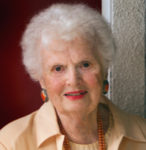By Natasha Josefowitz, ACSW, Ph.D.

LA JOLLA, California — As I get closer and closer to departing this planet—being in my mid-nineties is a warning bell—I look around and wonder what will I miss? Actually, this is a stupid question. When I’m dead, I will obviously not miss anything. What is it that makes this so uncomfortable? It is not death itself; it is the leaving of people and things that have mattered.
So I started wondering about attachments. There are several categories that I can think of:
Attachments to people: My husband Herman and I were symbiotically attached to each other. We felt not like two people, but one unit. When he died, I felt like half of me had been torn away. I am attached to my daughter and grandchildren and sorry that I will not know my four great-grandsons as teenagers. I have had and still have strong attachments to friends; some have been like a sister or brother.
Attachments to animals: Our pets are our constant companions, and when they die, we, mourn them for a long time. Herman and I cried for days and were bereft for weeks when we had to put our dog down. I still miss her.
Attachments to objects: Heirlooms are particularly meaningful—the bracelet my mother wore every day is a treasure linking me to her. When there is a fire or an earthquake and people can only grab one or two things, many take photo albums. The photos help keep the memories alive.
As I look around my home, I recognize that I am attached to my dwelling in general and to objects in it in particular—photos of my grandparents as well as all my grandchildren, my needlepoint pillows, books I will never reread, clothes I will never wear again, dishes I will never use, the little crystal ball Herman brought me from a trip. These are all an extension of my ego, part of me. I have imbued inanimate things with a life of their own. Children exhibit this attachment to a favorite blanket, a stuffed animal, or doll and are despondent when they lose it.
Attachments to memories and personal history: In trying to downsize, especially getting rid of my files, I am connected to my old Ph.D. thesis or some lovely student evaluations from a class I taught forty years ago. If I pretend I am my daughter, or my grandchildren, looking at all this stuff, I realize that what is important to me is irrelevant to them. “Grandma was with Dr. Ruth. Who is Dr. Ruth?” –> Toss. So I am able to do away with the remnants of my past life by pretending I am not me. I found this strategy to be liberating, and I am passing it on to you, my readers.
Attachments to places: It can be the country you were born in, the house you grew up in, your first home where the children were born. We are territorial animals, and we will fight for what we consider our territory and defend it.
Attachments to ideas: This is a commitment to one’s way of believing, excluding all other possibilities. It can be religion, politics, or philosophy. Letting go of beliefs is an important task when confronted with new contradictory evidence.
In the time of the pandemic, I find a different kind of attachment. Attachment to our pre-Coronavirus life: A time that may never return. We miss our connection to people, the freedom to go anywhere we wanted, eat in restaurants, or go to movies, the gym, beauty salons, or barber shops.
As humans, our attachments help to define us. This time is an opportunity to take a closer look and gain clarity as to what is truly important to us.
So it is time to let go, time to send off to family and friends some of my cherished treasures. I am giving each of my grandchildren one of my antique Russian lacquer boxes which belonged to my mother. Will her memory continue to live in her descendants? Nostalgia is painful. Giving away or tossing objects is losing the memory of those seemingly important events in our lives. I wonder how I will be remembered after I am gone?
*
© Natasha Josefowitz. This article appeared initially in the La Jolla Village News. You may comment to natasha.josefowitz@sdjewishworld.com
This is wonderful…Thanks!